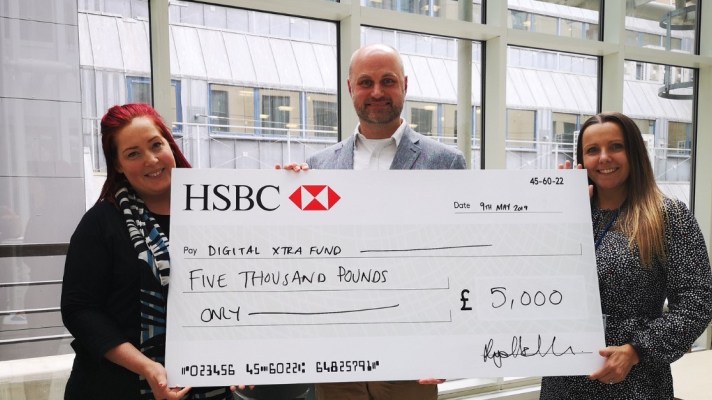Twenty five grants totalling £110,000 have been awarded across Scotland to help boost interest in computing and technology to help inspire the next generation of developers, designers and digital leaders.
Digital Xtra Fund announced it has increased its 2020 funding round by £35,000 and will now be awarding £110,000 to 25 tech related initiatives thanks to additional support from the Fund’s industry partners. The funding will enable these initiatives to engage young people across the country and help boost interest in computing and technology.
 This announcement comes hot on the heels of The Scottish Government’s ‘Report on STEM in early years of education’ which found that gender imbalances and disadvantages from living in areas of deprivation or rural isolation are creating serious barriers to engaging young people in STEM (Science, Technology, Engineering, Maths). It also highlights that systemic change is required to overcome these barriers and an increased focus on long-term interventions in school and early learning settings – including through extracurricular activities. Digital Xtra Fund emphasises awarding grants for initiatives that target girls and young women or are delivered in areas of high deprivation or rural settings.
This announcement comes hot on the heels of The Scottish Government’s ‘Report on STEM in early years of education’ which found that gender imbalances and disadvantages from living in areas of deprivation or rural isolation are creating serious barriers to engaging young people in STEM (Science, Technology, Engineering, Maths). It also highlights that systemic change is required to overcome these barriers and an increased focus on long-term interventions in school and early learning settings – including through extracurricular activities. Digital Xtra Fund emphasises awarding grants for initiatives that target girls and young women or are delivered in areas of high deprivation or rural settings.
The Report also highlighted that school staff are often paying for resources themselves or parents are called upon to fund and support activities. Specifically, a 2014 study by the Learned Societies Group found “98% of [primary school] respondents drew on additional funding for practical activities, with parental sources the most common source for extracurricular activities”.
Kraig Brown, Partnership and Development Manager at Digital Xtra Fund, explains: “The fact that almost all primary schools must rely on parents or teachers to fund extracurricular activities flies in the face of this Report’s recommendations. How can we hope to engage more young people from areas of high deprivation when the main source of funding is parents? Let’s be honest, technology is expensive, and we can’t rely on schools or parents to fund this.
“The good news is Digital Xtra Fund have increased our industry partnerships this year which will allow us to award £110,000 to 25 initiatives across 22 Local Authorities. This is a record amount since the Fund became a charity in 2017. The bad news is it’s still not enough; Scotland as a whole needs to invest in computing education and quickly, but with an ongoing shortage in computing science teachers we need to engage young people outwith the classroom too.
“The number of tech job opportunities in Scotland has risen from 12,800 to 13,000 per year while the number of people entering the job market with relevant tech skills has risen from around 5,000 to 6,600. While the increased number of skilled people is a step in the right direction, the lack of young people learning relevant tech skills is causing real problems for industry in Scotland. We need to show more young people the amazing opportunities available to them with a career in tech. Ensuring all young people have access to exciting, relevant tech activities is the simplest way to do this.”

To date, the Fund has helped 55 initiatives engage nearly 30,000 young people across Scotland by awarding a total of £550,000. This year’s grant recipients include an App Development course hosted by Heart of Midlothian Football Club focussing on Tech for Good, a Robotics Club at The Nicolson Institute in Stornoway and the expansion of FIRST LEGO League Jr in Scotland with The IET. The Fund’s industry partners will also have an opportunity to engage with supported initiatives to help provide context to the skills being taught.
Digital Xtra Fund brings together businesses, organisations, and individuals with a common goal to help young people succeed in a digital world through an annual grant awards programme. Key Partners include AWS, Baillie Gifford, Skills Development Scotland and Skyscanner as well as Accenture, BT Scotland, CGI, Cirrus Logic, Fujitsu, Incremental Group, Micro:bit Educational Foundation, ScotlandIS, Sky UK and The Scottish Government.
For further information about Digital Xtra Fund and this year’s grant recipients, please visit: www.digitalxtrafund.scot.
Created in 2016, Digital Xtra Fund is a Scottish charity which supports high-quality, extracurricular computing initiatives across Scotland that inspire young people to understand and create with technology, not simply use it. The aim is to encourage young people to consider careers in computing to fill Scotland’s digital skills gap. To date, the Fund has awarded £550,000 in support of 55 initiatives helping schools and organisations engage nearly 30,000 young people across all local authorities in Scotland.



 This announcement comes hot on the heels of The Scottish Government’s ‘Report on STEM in early years of education’ which found that gender imbalances and disadvantages from living in areas of deprivation or rural isolation are creating serious barriers to engaging young people in STEM (Science, Technology, Engineering, Maths). It also highlights that systemic change is required to overcome these barriers and an increased focus on long-term interventions in school and early learning settings – including through extracurricular activities. Digital Xtra Fund emphasises awarding grants for initiatives that target girls and young women or are delivered in areas of high deprivation or rural settings.
This announcement comes hot on the heels of The Scottish Government’s ‘Report on STEM in early years of education’ which found that gender imbalances and disadvantages from living in areas of deprivation or rural isolation are creating serious barriers to engaging young people in STEM (Science, Technology, Engineering, Maths). It also highlights that systemic change is required to overcome these barriers and an increased focus on long-term interventions in school and early learning settings – including through extracurricular activities. Digital Xtra Fund emphasises awarding grants for initiatives that target girls and young women or are delivered in areas of high deprivation or rural settings.

 CGI and Digital Xtra Fund have a common will to
CGI and Digital Xtra Fund have a common will to 
 “There is currently a huge IT skills gap in Scotland, and the only long-term solution is to encourage more youngsters to become interested in computer science and STEM subjects in school so they will consider a career in technology when they leave,” explains Robbie Robinson, global co-lead of
“There is currently a huge IT skills gap in Scotland, and the only long-term solution is to encourage more youngsters to become interested in computer science and STEM subjects in school so they will consider a career in technology when they leave,” explains Robbie Robinson, global co-lead of  Kraig Brown, Partnerships and Development Manager at Digital Xtra Fund, comments: “J.P. Morgan’s support is vital in enabling us to make a real impact on the lives of young people around Scotland. Our partners not only provide financial support but their staff can also volunteer to speak with young people about careers in tech, putting a personal face to the variety of roles these skills can lead to.
Kraig Brown, Partnerships and Development Manager at Digital Xtra Fund, comments: “J.P. Morgan’s support is vital in enabling us to make a real impact on the lives of young people around Scotland. Our partners not only provide financial support but their staff can also volunteer to speak with young people about careers in tech, putting a personal face to the variety of roles these skills can lead to.
 She explains: “Developing children’s resilience and self-confidence is a key aim. Learning programming and building robots requires skills like investigating, debugging and perseverance. There is a lot of trial and error when it comes to programming; children need to know failure is part of the design process. Overcoming difficulties while creating robots develops resilience and, once they are successful, is also very rewarding.
She explains: “Developing children’s resilience and self-confidence is a key aim. Learning programming and building robots requires skills like investigating, debugging and perseverance. There is a lot of trial and error when it comes to programming; children need to know failure is part of the design process. Overcoming difficulties while creating robots develops resilience and, once they are successful, is also very rewarding. “What is especially fantastic about Resilient Robotics is the success it has achieved in terms of sustainability. The original grant from Digital Xtra Fund supported the pilot programme at Port Ellen Primary School, however, it was quickly realised there was an excellent opportunity to expand this initiative across the island, including at the High School, as well as on Mull and Jura. The fact that some of the resources are also being translated into Gaelic will only add to the project’s legacy. It’s a fantastic programme which will make a real difference in the lives of young people from the islands.
“What is especially fantastic about Resilient Robotics is the success it has achieved in terms of sustainability. The original grant from Digital Xtra Fund supported the pilot programme at Port Ellen Primary School, however, it was quickly realised there was an excellent opportunity to expand this initiative across the island, including at the High School, as well as on Mull and Jura. The fact that some of the resources are also being translated into Gaelic will only add to the project’s legacy. It’s a fantastic programme which will make a real difference in the lives of young people from the islands.

 He explains: “It is essential we inspire more girls to get into tech from primary school, leading to increased uptake in secondary and therefore more women completing Higher and Further Education with a variety of technology related qualifications. Only by focussing on the talent pipeline from the beginning can we make a tangible difference in the end. However, despite considerable effort, we simply do not have enough computing science teachers to reach the level of engagement required to achieve this, and these numbers are getting worse. In 2008 there were 766 computing teachers in Scottish secondary schools, while in 2017 there were only 582 – a 24% reduction.
He explains: “It is essential we inspire more girls to get into tech from primary school, leading to increased uptake in secondary and therefore more women completing Higher and Further Education with a variety of technology related qualifications. Only by focussing on the talent pipeline from the beginning can we make a tangible difference in the end. However, despite considerable effort, we simply do not have enough computing science teachers to reach the level of engagement required to achieve this, and these numbers are getting worse. In 2008 there were 766 computing teachers in Scottish secondary schools, while in 2017 there were only 582 – a 24% reduction. Brown adds: “In addition to engaging girls at a young age, it is also important we improve the links between education and industry to ensure these young women, their parents, and teachers have the opportunity to understand the range of rewarding job opportunities in the tech sector. These links also give girls and young women the opportunity to see and speak with women currently in these roles to act as examples and mentors. This is where organisations like
Brown adds: “In addition to engaging girls at a young age, it is also important we improve the links between education and industry to ensure these young women, their parents, and teachers have the opportunity to understand the range of rewarding job opportunities in the tech sector. These links also give girls and young women the opportunity to see and speak with women currently in these roles to act as examples and mentors. This is where organisations like 

